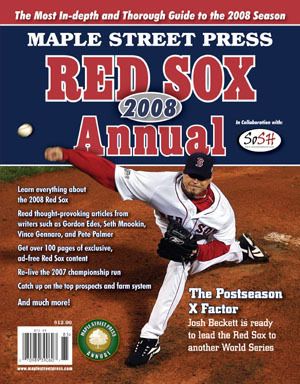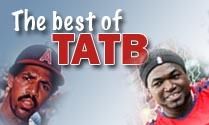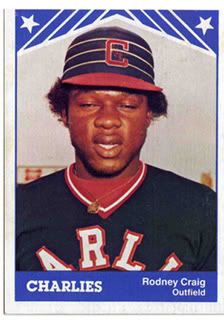Peace, Reese

Wade Boggs - the noted singles hitter, chicken aficionado and self-proclaimed connoisseur of certain X-rated pleasures - was elected to the Baseball Hall of Fame today, in his first year of eligibility and with an overwhelming 91.9 percent of the vote.
It is hardly a surprise. Only a fool or perhaps a liquored-up Margo Adams would dare argue that Boggs does not deserve baseball's highest honor. One plaque offers barely enough room to list all his individual accomplishments: 3,010 hits. Seven 200-hit seasons. Five batting titles. A .328 career average. Twelve All-Star games. Hall of Fame stats through and through.
Yet as Boggs commands the boldest headlines today, a story hidden a few pages deep into the sports section is sure to elicit a more heartfelt response from Red Sox fans.
Pokey Reese, a Red Sox for one shining, unforgettable year, signed a one-year contract with the Seattle Mariners.
Now, I imagine this makes little sense to outsiders - you know, those smug, ignorant dolts who claimed we enjoyed wallowing in our 86-year depression, who wondered if we'd lose our identity with a championship, who just don't get what being a Sox fan is all about. How could Sox loyalists have more fondness for Reese than Boggs, they'll ask? Pokey spent 10 fewer seasons in Boston. He accumulated roughly 2,500 fewer hits. And the only way he's getting into the Hall of Fame is with a ticket.
The answer is simple. We Sox fans are perceptive. It did not take Sherlock Holmes to deduce that Wade Boggs was first and foremost all about Wade Boggs. The well-being of the Boston Red Sox ranked somewhere further down the list. Put it another way: If he was 2 for 4 in a loss, it was a good night. But an 0-fer in a win? Look out, bat rack.
For all that Boggs accomplished statistically, he's strangely lacking in defining moments. So many of his hits were hollow, insignificant, meaningless. He specialized in the two-out single in the ninth inning of an already determined ballgame.
Let me ask: When you think of Boggs highlights, you think of . . . well, lowlights, right? His series-ending strikeout against Dennis Eckersley in the 1988 American League Championship Series. His decision to sit out the final day of the 1985 season to "win" the batting title over Don Mattingly. (Ted Williams's head is rolling over in his vat just thinking about such a thing.) His ridiculously goofy ride around the field on a police horse after winning a championship with the 1996 Yankees. Margo, chicken, willing himself invisible, and the proclomation, after his wife ran him over with the car, that he was "the white Irving Fryar." Irving Fryar should have been so controversial.
Even in a sport as intrinsically selfish as baseball - really, isn't it just a string of one-on-one matchups? - Boggs's Wade-first attitude stood out, and Sox fans have a notoriously low tolerance for such characters, even if they do hit .362 with an OBP that would make Bill James blush.
Which brings us to Pokey, the anti-Boggs in so many ways. Boggs is a born hitter who could probably slap one of the Monster tomorrow. A bat in Reese's hands in a self-defense mechanism. Boggs had to work to become a capable third baseman. Reese is the most graceful athlete ever to wear the Red Sox jersey. Boggs, balding, now pitches for a hair-replacement company. Reese, when he takes his cornrows out, has an Afro that would make a young Oscar Gamble envious.
But most dissimilar to Boggs, Reese put the team first, always, even when it did not benefit him. Remember early in the season, when Reese was gliding around shortstop every day in place of the injured Nomar Garciaparra? It seemed every other game brought a did-he-just-do-that play, such as his sky-grabbing snare of Dave Roberts liner in June against the Dodgers - maybe the most athletic play by a Sox player ever. He was on the fast track to folk hero status, especially after his two-homer game against Kansas City. "Poke-ees bet-ter!" became a popular Fenway chant when Derek Jeter came to town, and cruelly, even after Nomar returned from the infirmary. But the adulation was temporary. Reese got hurt (his fatal flaw - he simply can't stay healthy), Nomar got traded, and the caffeinated Orlando Cabrera arrived and made the position his own.
Reese was the forgotten man. So how did he react? With a personal grace Boggs could not comprehend. His smile remained friendly and familiar, and he hustled his skinny butt off when he did play. He played stellar defense in the late innings. He came up with crazy handshakes for his teammates and struck up a friendship with Cabrera, the man who replaced him. If he was hurt or frustrated, he refused to reveal it. The team came first.
When the Sox finally defeated the Yankees, it was Reese who fielded the ground ball for the final out, an image that will replay in Sox fan's memories (and our DVD players) from now until our final innings. Something seemed appropriate about that.
When the Red Sox won the world championship, he was right there in the middle of the pig-pile on the Busch Stadium turf, his joy unadulterated, proud to be a champ.
And at no time did he board a friggin' horse.
Boggs has his Hall of Fame, and the affirmation that he is one of the greatest individuals in his sports history. But Pokey Reese has something more valuable. A Red Sox World Championship ring, and with it, a permanent place in New Englanders hearts.
Wade Boggs, the brand new Hall of Famer, should be so lucky.














|
<< Home